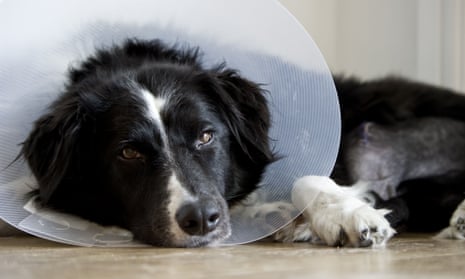The stereotype of Brits as a nation of pet-obsessives has been given a fresh boost by a survey showing that increasing numbers of firms are giving staff paid time off work to care for their animals. According to the insurer Petplan, almost one in 20 new pet owners in the UK have been offered time off to look after for a sick or newly homed animal. Some companies allow employees to take a few hours off to settle in a new pet, while a tiny minority offer as much as several weeks.
This seems only fair to me. As a pet lover with three rescue animals of my own, I know how much time can go towards taking care of them. My dog Maisie, well known to Guardian readers, came to us all the way from Ireland, where she had been badly abused and neglected. The physical and emotional damage Maisie had suffered in those few short months before we took her in meant several trips to the vet as well as, at least for the first few weeks, a rota to ensure she was not left alone.
Our two cats had similar beginnings, and came to us with problems. This meant more vets’ bills, more time looking after them, and a few sleepless nights.
As a freelancer, any time I take off for whatever reason is unpaid. But plenty of pet owners I know with proper jobs tend to assume that they have to take annual or unpaid leave to care for pets, even in a life-or-death emergency.
It is my choice to have pets, as it is for parents to have children. After decades of feminist campaigning, many women in paid employment are entitled to decent maternity leave and other benefits. Pet-ernity or paw-ternity leave is not something that the majority of pet owners expect to be entitled to, according to research published last year by the animal welfare charity Blue Cross. A survey of 2,000 pet owners found that more than four in 10 have “pulled a sickie” from work because of their pet.
Nearly half were forced to take time off after the death of a pet because they were too heartbroken to face work, and although 65% of owners had taken time off work to attend a vet appointment, one-quarter of those polled could not face admitting the real reason for their absence to their boss.
I have lost count of the times female colleagues have left work early to pick up their children when their childcare has fallen through, or not come to work because of interrupted sleep. I am in no way suggesting we should prioritise animals over childcare, but can’t we recognise that many of us have caring duties that do not involve mini-humans?
According to the Blue Cross survey, pet owners feel stigmatised when asking for time off work. Over half (56%) chose not to give their employer the real reason for taking the day off if their animal was sick or had died, and one in seven thought they would be laughed at. Almost a quarter of grieving pet owners kept the loss of an animal to themselves.
Only half of the parents who took part in the survey said they would allow their children to take the day off school in the event of a pet dying. This is brutal. To this day I remember Jerry, the pet gerbil I had when I was five years old. I closed the door on him by accident, which resulted in his little head parting company with the rest of him. I sobbed my heart out for weeks. Throughout my life I have taken care of rescue animals and have been brokenhearted when they die. Can we not give some compassion to those who care for animals in need of love and protection – especially those of us who don’t have children, and therefore can usually boast a smaller carbon footprint?
Many pet lovers find that caring for them reduces stress and counters depression. Surely this results in fewer days off sick? I bet there are more hours lost from those in animal-free households watching Pet Rescue in bed, too idle to get into work, than there are those of us rescuing pets.
